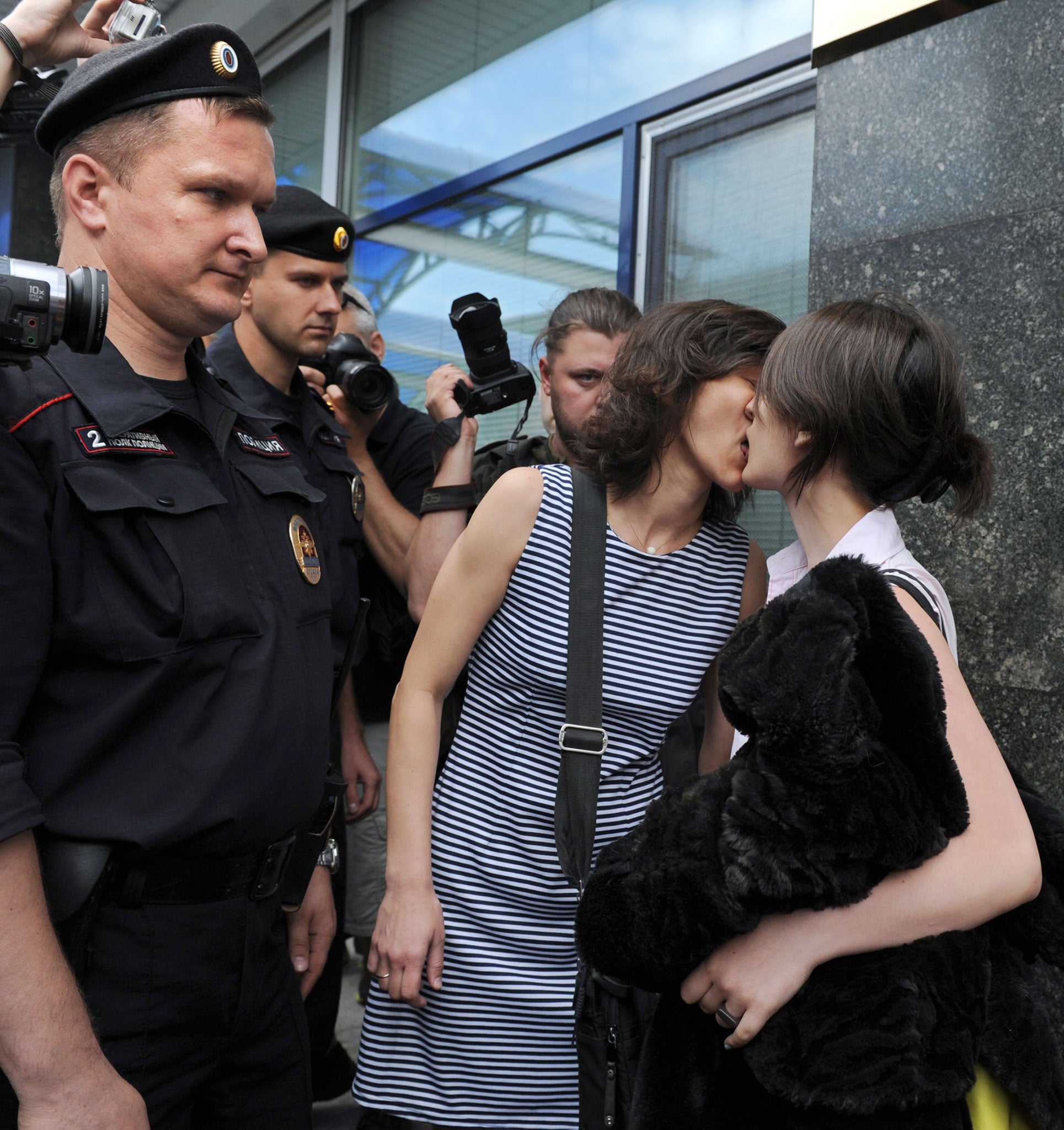Gay Propaganda: Russian Love Stories, edited by Masha Gessen and Joseph Huff-Hannon Words Will Break Cement: The Passion of Pussy Riot by Masha Gessen, book review
Two books that capture the spirit of protest against Putin's administration

In 2006, while working as a news reporter, I was sent on a hare-brained assignment to Kazakhstan to find the "real-life" Borat, shortly after the release of Sacha Baron Cohen's film. What were the chances of success?
Miraculously, I stumbled across a close approximation: a local TV celebrity in Almaty with big dreams who showered me with tourist trinkets from the airport shop and talked about breaking into television abroad. It was hard not to warm to his outlook – until he started talking about homosexuality. How "in the Soviet Union, it was a crime. We were told it was our duty to beat them. It is different now – we have at least three gay bars in Almaty..."
Judging from the true accounts in Gay Propaganda: Russian Love Stories, it seems as if Soviet bigotry is still ensconced in the Kremlin. Where Pussy Riot's punk performances have shown what waves a high-octane protest can make, this book presents another way for state repression to be resisted: by telling one's story and distributing it. Gay Propaganda is composed of verbatim love stories (not all with happy endings) spoken by gays, lesbians and transsexuals either living in Russia or emigres, not least the book's co-editor, Masha Gessen, who left Russia after "Vitaly Milonov, the St Petersburg politician who was one of the main spokespeople for the 'propaganda' bill, told the country's highest-circulation daily that Russian orphans needed to be saved from 'perverted families like Masha Gessen's'."
In his forward, Garry Kasparov compares Germany's 1936 Olympics to Sochi's in 2014, and obliquely, Hitler's Nazism to Milonov's "gay propaganda" laws, which enshrine the removal of children from gay couples into law. Beyond this contextualising, we hear of lived experiences and the book reads like 21st century samizdat, published in both Russian and English. The interviews seem to be little more than edited transcriptions of dialogue between couples. Their simplicity is where their potency lies. The couples speak of harrowing experiences, but also say the most breathtakingly romantic things and it feels as if they are saying them to you, the reader.
There are dedicated campaigners among them, but there are just as many people who want to get on with their lives, to be seen as "ordinary". Some find it easier to lead an ostensibly "straight" existence to avoid the wrath of the family, society and the state. Yet as several interviewees say, being gay becomes a form of protest in itself, even for those who do nothing more "activist" than live openly in same-sex relationships. Almost all talk of fear – of the loss of employment and of ostracism by families who are stuck between the legacy of Stalinism and religious Orthodoxy. Emigration and personal safety are repeated preoccupations: how to get away from the bigotry and beatings, how to feel that their children will not be kidnapped, often by outraged grandparents, how leaving Russia is a relief and a tragedy.
Not all of it is bleak: there are parents and grandmothers who shift from homophobia to acceptance. There are amicable straight ex-partners and best of all there are burning romances. One couple spend 22 years apart before they re-united. A spirit of proud defiance rises above the fear when Denis, a musician, says: "I've never felt like an outcast or abnormal. Other people treat you how you treat yourself." There is also poetry – the extraordinary captured in the everyday. So Irina sees the pink of Olga's dress, set against a grey "Soviet" sky, and follows her. A woman first notices her partner's hands and "they floored me". There is even a gay couple, Andrei and Roman, who run the only gay club in Sochi. Look out, Putin.
Activism leads to alienation, someone says. This isn't the case for the young "Pisya Riot Collective" in Gessen's Word Will Break Cement. A punk performance inside a church led to jail sentences but also to immense popular and international support, though it came at a price. Gessen pulls together a psychological portrait of the three ring-leaders' early lives. She has plenty of primary source material despite the women's absence (two were in jail at the time of writing) – letters they send her from prison, access to family members and their astonishing courtroom testimonies. What emerges is a picture of women who are deeply ideological, often encouraged by their fathers in early life, slightly naive but fiercely intellectual and very, very brave.
Subscribe to Independent Premium to bookmark this article
Want to bookmark your favourite articles and stories to read or reference later? Start your Independent Premium subscription today.

Join our commenting forum
Join thought-provoking conversations, follow other Independent readers and see their replies